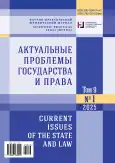Social insurance in the system of social protection of population: state and prospects of development
- Authors: Levashova O.V.1, Tolochko A.V.2
-
Affiliations:
- Lipetsk Branch of The Russian Presidential Academy of National Economy and Public Administration
- Bunin Yelets State University
- Issue: Vol 9, No 1 (2025)
- Pages: 24-34
- Section: General Theory and History of Law and the State
- URL: https://journal-vniispk.ru/2587-9340/article/view/295199
- ID: 295199
Cite item
Abstract
The study attempts to analyze social insurance in the system of social protection of population. The Constitution of the Russian Federation defines that Russia is a welfare state, therefore, one of the forms of social support for the country’s population may be state-created technologies, methods and techniques of social insurance as an economic institution based on the property interests of citizens. Social insurance is associated with reducing the level of social risks for the working population in cases defined by law and related to social reality in the context of compensation for the occurrence of an insured event. This is one of the most important forms of government support for the population in difficult circumstances that citizens may experience for various reasons. The purpose of the study is to analyze the state of social insurance in the Russian Federation as a socio-legal and economic institution, methods and ways of its implementation and development prospects in the context of social protection of population. The methods of scientific research are a set of scientific methods of cognition of social processes of both a general scientific and sociological nature. Methods of structural and functional analysis and diagnostics of social processes were applied to determine the consistency and integrity of the study. In addition, general logical methods were used in the work: analysis, synthesis, generalization, comparison. The tasks of applied sociological research have necessitated the use of such methods as observation, document analysis, and design. The practical significance of the study lies in the fact that its content and results, main generalizations and conclusions contribute to a deeper understanding of the specifics of social insurance in Russia, its further improvement, solving problems of informing citizens, and the results of the analysis may be of interest for the practical activities of social management bodies. Thus, the existing social insurance system is aimed at increasing and improving the quality of life of the population of the state. And in the current economic situation, it requires improvement and further development.
About the authors
Olga V. Levashova
Lipetsk Branch of The Russian Presidential Academy of National Economy and Public Administration
Author for correspondence.
Email: olia.levaschova@yandex.ru
ORCID iD: 0000-0002-1723-0465
Cand. Sci. (Law), Associate Professor, Associate Professor of Criminal Law, Process and Criminology Department
Russian Federation, 3 Internatsionalnaya St., Lipetsk, 398050, Russian FederationAleksander V. Tolochko
Bunin Yelets State University
Email: tolochko@rambler.ru
ORCID iD: 0000-0002-5334-7097
Cand. Sci. (Politics), Associate Professor, Associate Professor of Philosophy and Social Sciences Department
Russian Federation, 28 Kommunarov St., Yelets, 399770, Russian FederationReferences
- Baltatarova S.B., Mizhitdorzhiyeva S.D. (2021). Economic foundations of social protection of the popula-tion. Skif. Voprosy studencheskoy nauki = Sciff. Questions of Students Science, no. 7 (59), pp. 226-229. (In Russ.) https://elibrary.ru/mlevog
- Brezhneva O.V., Nurgaliyeva G.R. (2018). Current problems of social insurance in Russia. Alleya Nauki = Alley of Science, no. 5 (21), pp. 735-738. (In Russ.) https://elibrary.ru/xrkpml
- Solov’yeva V.V. (2023). Welfare state: philosophical and legal aspect. Aktual’nyye problemy gosudarstva i prava = Current Issues of The State And Law, vol. 7, no. 2 (26), pp. 205-211. (In Russ.) https://doi.org/10.20310/2587-9340-2023-7-2-205-211, https://elibrary.ru/zrulol
- Vasil’yev A.V. (2018). Problems of social insurance and its development strategy in the Russian Federation. Molodoy uchenyy = Young Scientist, no. 50 (236), pp. 223-224. (In Russ.) https://elibrary.ru/yraihb
- Andryushchenko G.I. (2012). Modernization of Social Insurance in the Russian Federation. Dr. Sci. (Eco-nomics) diss. Moscow, 377 p. (In Russ.) https://elibrary.ru/qfmksn
- Ninalalova F.I. (2020). Functioning of the social insurance fund in the new economic conditions. Vestnik Dagestanskogo gosudarstvennogo universiteta. Seriya 3: obshchestvennyye nauki = Herald of Dagestan State University. Series 3. Social Sciences, vol. 35, no. 4, pp. 81-89. (In Russ.) https://doi.org/10.21779/2500-1930-2020-35-4-81-89, https://elibrary.ru/dvtsvs
- Luneva U.S., Startseva S.V. (2021). Changes in legislation regulating payments to families with children. Mezhdunarodnyy zhurnal gumanitarnykh i estestvennykh nauk = International Journal of Humanities and Natural Sciences, no. 11-1 (62), pp. 153-155. (In Russ.) https://doi.org/10.24412/2500-1000-2021-11-1-153-155, https://elibrary.ru/efspit
- Karpova A.V. (2020). Social Security Law. Moscow, INFRA-M, 175 p. (In Russ.)
- Kosarev Yu.A. (1999). Conceptual Models of State Social Insurance as a Form of Social Protection and National Security of Society in the Post-Reform Period. Dr. Sci. (Sociology) diss. Moscow, 305 p. (In Russ.) https://elibrary.ru/qdlfch
- Miller O.S., Morozova E.A. (2020). Transformation of social insurance as an instrument of social security. Vestnik Kemerovskogo gosudarstvennogo universiteta. Seriya: Politicheskiye, sotsiologicheskiye i ekonomicheskiye nauki = Bulletin of Kemerovo State University. Series: Political, Sociological and Economic Sciences, vol. 5, no. 1 (15), pp. 113-120. (In Russ.) https://doi.org/10.21603/2500-3372-2020-5-1-113-120, https://elibrary.ru/vbntjc
- Migranova L.A., Roik V.D. (2020). Social insurance in Russia: state, current challenges and responses to them. Nauchnoye obozreniye. Seriya 1: Ekonomika i pravo = Scientific Review. Series 1: Economics and Law, no. 1-2, pp. 75-95. (In Russ.) https://doi.org/10.26653/2076-4650-2020-1-2-07, https://elibrary.ru/shtptr
- Grinberg R.S. (2021). The Russian Socio-Economic System: Realities and Development Vectors. Moscow, INFRA-M, 596 p. (In Russ.) https://doi.org/10.12737/1087982, https://elibrary.ru/gbixmo
- Roik V.D. (2013). Economics, Finance and Social Insurance Law: Institutions and Insurance Mechanisms. Moscow, Al’pina Publisher, 256 p. (In Russ.)
- Kvashnin Yu.D. (ed.) (2016). Welfare State in the EU Countries: Past and Present. Moscow, Primakov Na-tional Research Institute of World Economy and International Relations Publ., 189 p. (In Russ.) https://elibrary.ru/xsdxjd
Supplementary files








